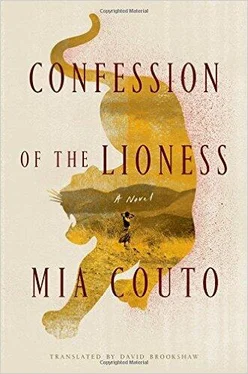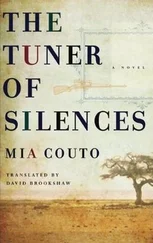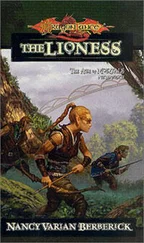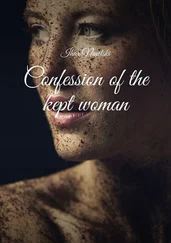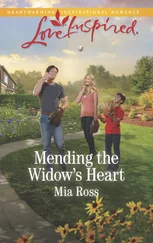It was the pigs that showed the lions how to get here.
The wild pigs would visit the kitchen gardens, attracted by the crops planted around the houses. The lions followed on their trail and so broke into a space they’d never dared invade before.
* * *
Later, while tidying my things, I catch the writer taking a look at my diary. I don’t interfere. I let his greedy fingers turn the pages of my little notebook. In fact, rather than finding it irritating, I’m filled with an unexpected vanity at his interest. Could it be that the artist himself recognizes the value of my artistic endeavors?
I don’t know — I’ll never know — what Gustavo thinks of what he is reading. What I do know is that at a certain point, his hands tremble and there’s a glint in his eye.
* * *
The sight of the papers shaking in Gustavo’s hands takes me back to my childhood. Once again, I see the day when Roland was obliged to check the true content of the missives that my mother spent her time composing. And my father, arms crossed on his chest, awaiting the supreme judgment. Indeed, I also asked myself: Were the letters that Martina wrote faithful to what my father dictated?
This is what happened on that occasion: My father stopped his dictation and stood there in silence for some time.
Well, then? his wife asked, seeing him absorbed.
I don’t believe you’re writing down what I told you to , he replied, advancing resolutely toward his wife.
Henry Bullseye brusquely snatched the letter from his wife’s hands. He turned the sheet over, this way and that, next to his face as if he were looking through the paper. For me, this was proof of what I had long suspected: My father couldn’t read.
Roland, my son, come here.
My brother got up, quivering from his soul to his feet. Our old man handed him the notebook, staring fixedly at his firstborn.
Read out loud what’s written here.
Roland stared wide-eyed as if struggling to focus clearly. The lines danced before his trembling hands. His voice was all of a muddle, unsure of where to begin.
Read!
Where, Father?
Read. Read wherever you like.
My mother looked at him imploringly. Roland stared at me aghast, terrified. Then he took a deep breath, and I didn’t even recognize his voice as it rang through the room:
My darling Henry, my beloved husband …
Go on, continue …
… One and only love of my life.
I examined my mother’s face and I saw her sadness, the sadness of all humanity.
* * *
It isn’t long before the welcoming banquet, scheduled to take place in the center of the village, is going to begin. The writer wants to gain time and make use of the hour before it starts to interview witnesses and take down statements. I go with him. We wander haphazardly along the paths of Kulumani. I walk in front, my rifle over my shoulder, my gait military. The writer asks me why I need a weapon in the middle of the day, and in the middle of the village.
Animals have a different way of distinguishing between night and day, bush and village.
I begin to get an idea of the size of the village. The huts extend over the other side of the river and cover the slopes on the opposite bank. The village has grown since the last time I was here. Those who have settled along the banks of the Lideia are almost certainly war refugees.
The villagers greet us, standing aside to let us pass along the narrow paths. Some seem to remember me. And I go along distributing pleasantries:
Umumi?
Nimumi , they answer merrily, astonished to hear me greet them in the local language.
They smile. But their happiness gives way to a look of apprehension. These men are bound together by the same vulnerability: They are doomed, awaiting the final blow. For centuries they have existed in the margins of the world. That’s why they are suspicious of this sudden interest in their suffering. This suspicion explains the reaction of one of the countrymen when Gustavo asks to interview him:
Do you want to know how we die? No one ever comes here to find out how we live.
Mangy dogs cross our path like wandering shadows. Yet these dogs, at first so shy, surrender to the slightest caress and nestle against our hands as if they yearned to be people. The writer calls them, and tries to stroke them. People watch him, puzzled: They don’t expect dogs to be caressed, much less spoken to. These domestic creatures are never addressed by word, nor are they given any scraps of food: They just eat what they can hunt, so that they won’t begin to take existence for granted.
* * *
Dozens of villagers have gathered together under the mango tree out of curiosity. It’s incredible how someplace so deserted can suddenly fill up with folk who seem to have emerged from the sand. I look at this trading of self-interest with cynicism. The writer is a bird of prey: He seeks tales about the war. The villagers expect some gratification. A gift, in local parlance. How can someone criticize me for my professional activity? I practice hunting. Well, the writer lives on carrion. He embarked on this journey in order to peck at misfortune, among survivors who sorrow in silence.
Scratching at the wounds of the past: That’s what Gustavo is doing by dragging up memories of the civil war.
What do you remember most about the war?
There’s nothing to remember, my good sir , one of the countrymen replies.
What do you mean by that?
We all came back from the war, dead.
I turn my face away. I don’t want anyone to detect the vengefulness in my smile. No war can be recounted. Where there’s blood, there are no words. The writer is asking the dead to show him their scars.
It’s then that I realize what the pleasure is that I get out of hunting: to delve back beyond life, free from being a person.
* * *
The blind man who followed us around the night we arrived is in the crowd waiting to be interviewed. At one point, he leans on the shoulders of the person in front of him and salutes us extravagantly. He is still barefoot, wearing the same military fatigues.
Which army did you fight for? the writer asks.
I fought in all of them , comes the immediate reply. And pointing toward me, he adds: And I remember that gentleman’s voice very well.
My voice? That’s impossible.
Forgive me, I don’t want to offend, but I’d like to ask you a question: Why did they send for a hunter? They should have summoned me, a soldier.
I don’t understand , the writer argues. What’s this got to do with soldiers?
Don’t you see? This, my good sir, isn’t a hunt. This is a war.
It was war that explained the tragedy of Kulumani. Those lions weren’t emerging from the bush. They were born out of the last armed conflict. The same upheaval of all wars was now being repeated: People had become animals, and animals had become people. During battle, bodies had been left in the bush, along the roads. The lions had eaten them. At that precise point, the creatures of the wild had broken a taboo: They had begun to see people as prey. At last, the blind man brought his long speech to a close:
We men are no longer in charge. Now it’s they who control our fear.
Then he pontificated eloquently and without interruption:
The same thing happened in colonial times. The lions remind me of the soldiers in the Portuguese army. These Portuguese took over our imagination so effectively that they became powerful. The Portuguese weren’t strong enough to defeat us. That’s why they organized it so that the victims killed themselves. And we blacks learned to hate ourselves.
Читать дальше
